#the only problem is that because he's driven towards his goals by his PTSD and survivors guilt
Text
"I've been waiting for ages for somebody to unmask them."

This moment tends to elicit negative reactions in a first read through, and I've got some opinions about why where Kabru is coming from here actually makes a lot of logical sense. So I thought I'd elaborate on that.
I think people hear this and go, "He thinks they must be hiding something because they gave money to someone? What a cynic." Or "he dislikes them because they did charity?? What's wrong with this guy!". And obviously, a lot, a lot is wrong with him. But I think this makes more sense than it seems at first glance! What people evaluating this judgement miss is why Kabru is paying attention to Laios and co to begin with.
Kabru knows of the Touden siblings because (he's a little bit of a stalker-) he is keeping an eye on all the relevant parties in events developing on the island, in order to be able to guide them to his preferred outcome. This includes adventurers because they are the ones actually exploring the dungeon! He's well aware that something as minor as internal tensions between party members could be key to the historical events that are developing. (He would love the assassination of Archduke Franz Ferdinand.)
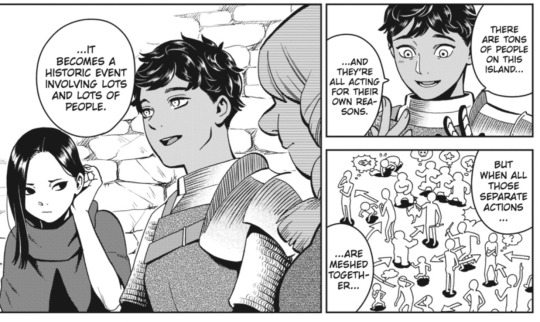
His desired outcome is that whatever the rewards are of breaking the dungeon's curse, whether that's kingship or the ancient elven secrets of dungeons, are claimed by:
A) a short lived person
B) Someone who will be a good, effective leader and/or use those secrets and the power they carry wisely, with foresight, and to establish a political bloc for short lived people.
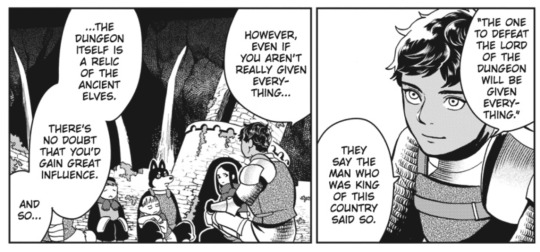
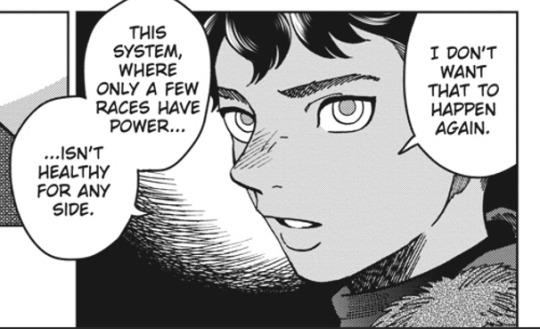
The person he can best trust to do this is, of course, himself. But due to his PTSD regarding dungeons and monsters, he's not able to develop the necessary skills to conquer the dungeon. Once he realises this, he starts looking for someone else who he can support to that end.
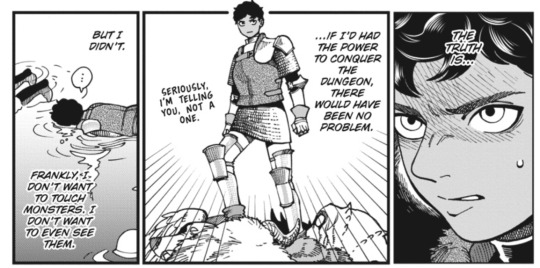
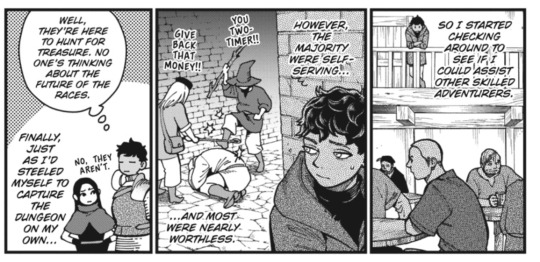
But most of the adventurers don't have any intentions of conquering the dungeon, don't have the skills, or are unsuitable in other ways. In fact, it seems like some potentially suitable people are the Toudens. There are a lot of good rumours about them going around - they actually seem to have a very positive reputation! That's what Kabru means when he says "unmask".

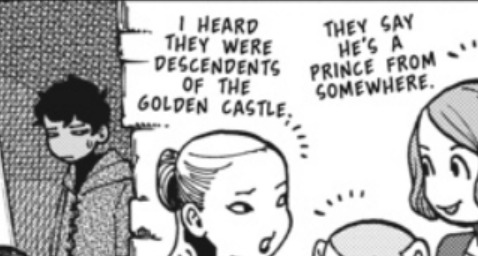

So when Kabru is observing something like them giving money to an old comrade from their gold-peeling days, he doesn't consider it a problem because "they're giving money to this person who doesn't actually need it" or because they must have some dark secret if they act superficially nice. I think he actually understands this situation and what it implies about Laios (in particular) perfectly well.
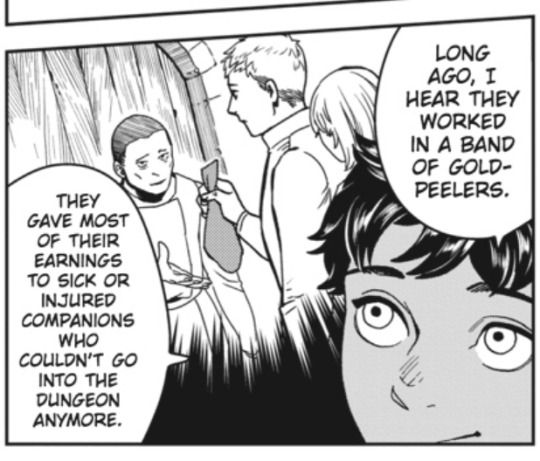
Laios and Falin gave money to an old comrade who got injured and couldn't work. That person then healed up but kept taking their money. Then he used the money to start smuggling illicit goods to the island.
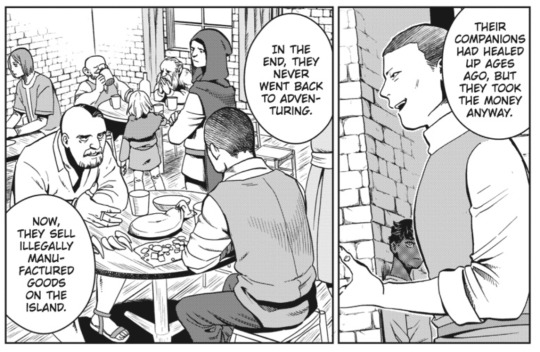
The key is that for Kabru, the problem here is the same as with the corpse retrievers - people using the dungeon's resources to fuel dangerous, selfish, or violent pursuits cause problems for the island, attract more criminals and people with motives other than breaking the curse, and increase the chances of the whole situation ending in tragedy.

Kabru is willing to work with the Shadow Lord of the island if it gets him to his goal - he isn't scrupulous - but the criminal element of the island increasing is something he sees as a major issue.
Also, when you're evaluating someone as a candidate for power, riches, secrets, potentially kingship - then being curious about how the money you give to people is going to be used is kind of a relevant trait!
Interpersonally, Kabru's actually very easygoing - I mean, Mickbell isn't exactly an upstanding guy, is he! But Kabru likes him and they get along well. These traits wouldn't be a problem at all in a friend, or a comrade, or someone Kabru was confident he could use. But he can't get a handle on Laios, and Laios is someone who has the potential to be a major player!
On Laios' end, this is the same as with the marriage seeker who joined their party. She kept asking for things and he gave them to her, because he tries to be nice to others. He even gives her money! It's the exact same thing.
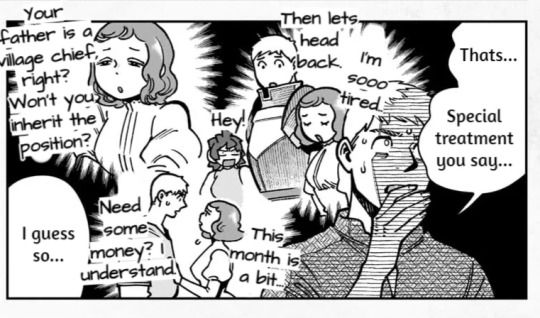
That's fine, but it became a problem because he basically wasn't interested in her motives, didn't notice she was trying to manipulate him, and it also didn't occur to him that the other party members would notice or be affected. We can assume the situation with the gold peeler is the same. When Kabru says that "It's not that they're bad people, they just aren't interested in humans," he isn't wrong.
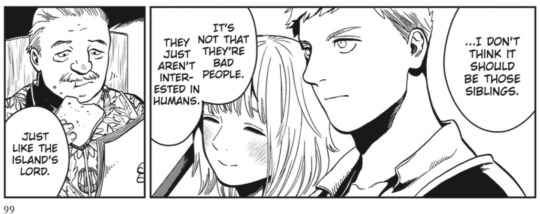
The extent to which this is true of Laios is linked to his autism imo, (because it isn't just disinterest - he genuinely isn't able to notice nonverbal cues that people are lying to him or have ulterior motives) but to a greater or lesser extent I think it's a very common trait. Most people aren't actually that interested in other people who aren't close to them. Kabru is the weird one here. It isn't an issue except as a leader - which is why we see an immediate comparison to the Island's Lord, because that's how Kabru is evaluating them.
And disinterest in/lack of ability with people to the extent Laios exhibits it, it does, actually, make him a worse leader... it's just that as we see in the story, people can help him out. The rest of the party tell him the marriage seeker is taking advantage of him so he tells her he can't give her special treatment anymore. They're pissed and it's a crisis point - he couldn't have recovered their trust without Marcille and Falin - but that's exactly the point. With Marcille and Falin, he was able to recover their trust.
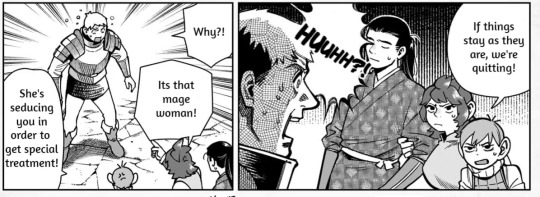
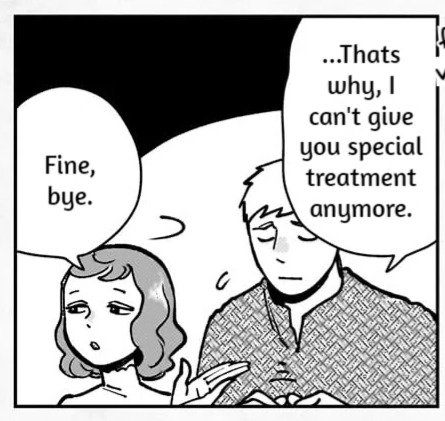
And he has other good traits that make up for it, such as his intelligence, strategic knowledge, open-mindedness and sense of fairplay.
Kabru doesn't disqualify Laios as a candidate based on what he sees about him from afar, though - he still tries very hard to get close to him, obviously hoping that if he manages he can steer Laios to defeat the dungeon and make up for his lack of people-skills in the aftermath. (Which... he does eventually achieve that goal!) He completely fails until the events of the story, so... definitely I think "They just aren't interested in humans" could also partially be a stung reaction to Laios' complete disinterest in him.
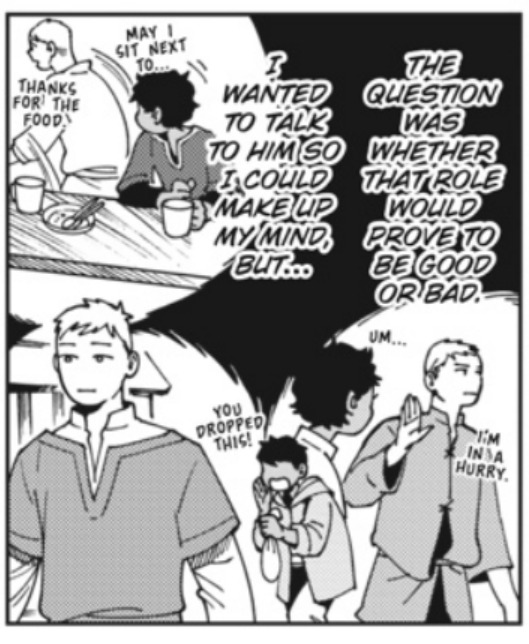
Anyway, that's my read on what exactly Kabru's "issue" with Laios is. Obviously, once he does find out what Laios' true nature is like - about his love for monsters - he develops an entirely new set of fears about Laios' priorities. But since Laios kept that a secret until the start of the story, he has no idea of that yet.
Given all that, I think it's interesting that he says that he doesn't think that the Toudens are suitable to defeat the dungeon, and that he's hoping they'll turn out to be the thieves. As some of his few potential candidates, people who he thinks may play a big role in the island's future, you'd think he'd hope they would be good people!
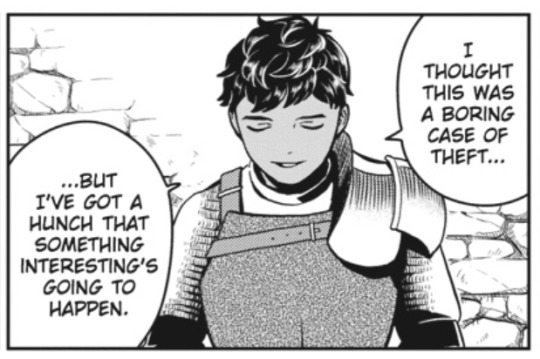
I suppose it's better, in his eyes, because it means that he's involved in something "interesting". They haven't just had their stuff stolen by regular criminals (boring, puts them further away from his goal) - they've been caught up in the beginning stages of "a historic event". The desperate and dwindling group forgetting morals in their quest to retrieve their lost comrade probably appeals to his sense of melodrama. Because he also just... loves drama.
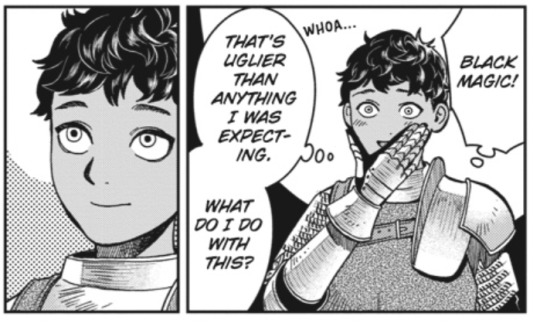
Despite it being "uglier than anything he was expecting", he still pursues Laios as the person he wants to conquer the dungeon pretty much as soon as it becomes clear that he won't be able to do it himself and they are out of time. That's because... well, to be fair, there aren't any other options. And he fits standard A: he's short-lived!
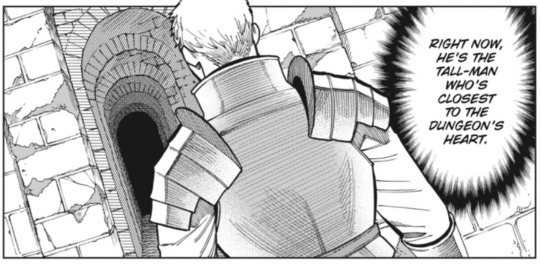
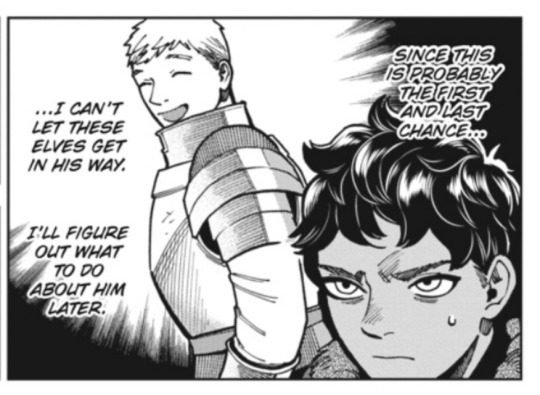
and Kabru still hopes he can fit standard B, too, and be persuaded to use the power he wins for good. No matter how many nightmares he has about Laios, or whether he thinks about killing him. He doubts him, but ultimately he puts his faith in him and seems happy after the manga's ending that he made the right decision.

#dungeon meshi#dungeon meshi manga spoilers#dungeon meshi meta#kabru of utaya#laios touden#labru#laios x kabru#dunmeshi#og post#kabru is such a big picture thinker. and he evaluates people more than he judges them imo#the hater jokes are funny but the people he judges most harshly arent laios and co. they're people like the island's lord.#but you don't see that as clearly because he isn't interested in the island's lord. he understands him. finds him contemptible but useful.#whereas laios lives in his brain rent free because he WANTS to understand him but doesnt quite.#even though he sees the elves as a major threat to his ultimate goals and dislikes the way they treat short lived races#he still understands and evaluates mithrun as an individual based on his own merits#he's one of the characters who is least judgemental in that sense because while he's always making judgements and evaluations#he's also constantly revising them whenever he gets more information#my beautiful machiavellian prince <3#it's genuinely a really laudable way of understanding others imo.#the only problem is that because he's driven towards his goals by his PTSD and survivors guilt#he pushes himself into situations (the dungeon and also interpersonally) that trigger him or even just upset him#without regard for what he authentically wants or his own wellbeing.
3K notes
·
View notes
Note
I’m rereading Vicious and after knowing everything about Vengeful everything that Eli did on vicious makes so much sense.
The first time I read Vicuous I always wondered what exactly went through Eli’s head, what was he thinking? When he looked for Victor when Victor was about to replicate his experiment? Was Eli concerned about Victor or was Eli was acting for selfish reasons? What was he thinking and feeling after he got his powers? What was he thinking when Victor attacked him and why was he so quick to think Victor was a devil in disguise? What was his last thought when he was about to become an Eo and how does it relate to healing? What was his thought process when he was trying to give up his life to god and when he decided that killing EOS was the “right” thing to do?
And after reading Vengeful everything becomes so much clearer, his last thought was probably about how he wanted to be “healed and saved” he internalized so some much religious trauma that it affected the way he acted and his thogught porcess, he witnessed his mother suicide on a bathtub and that’s probably why he chose that method both times before and after becoming an EO, his father used to beat him as a kid because he supposedly “had the devil in him” and he does feels like one through his life, doing his best to act as “normal” as possible.
His mother death also explains why he was so worried about Victor and even in the first book Eli talks very fondly of him even referring to him as his best friend and he explains to Serena he thinks Victor died and something sinister replaced him after becoming an EO and this conclusion although rash, it make sense he would try to rationalize and in a way justify the awful things that Victor did after turning into an EO.
And even in vengeful he started imagining Victor to kept him company when he was going through hell, he admits to himself that Victor was the only person who ever truly “saw” him and understood him, pretty much confirming that the “rivalry” Victor and Eli had was mostly one-sided and Eli really did loved him and consider him his best friend.
This also explains his weird behavior towards Victor when Vic himself was trying to turn himself into an EO, Eli witnessed his mother death and probably didn’t wanted the same to happen to Victor after Eli himself almost died trying to recreate it.
The first book also explains that he tried to take his life a second time after Victor got arrested begging for God to take away his power if it had been a mistake, he seemed to externalize all of this negative experience and feelings through his purpose of exterminating the EOS because he sincerely believed that was the right thing to do, his faith although horribly used and mishandled seemed to be genuine based on how we was him literally begging to god to take his life back if everything had been a mistake.
Everyone one of his actions seem to be driven by his childhood and religious trauma and it’s incredible sad to me, he wan’t a sociopath or a psychopath he was just very broken and delusional individual.
And his experience with Serena who forced herself into him also didn’t helped the whole “EOS are devils in disguise” perspective , even since I read the first book (when I didn’t knew anything about Eli yet) I was very repulsed by what Serena was doing to him, to the point that even though I greatly disliked Eli at first I kind of hated Serena more for what she was doing to him. I am also a little disappointed in how the fandom barely acknowledges that what Serena did to Eli was incredibly wrong and messed up.
I have already said this, but the fandom seems to treat Eli very unkindly, they brush over all of his story and just label him as a “sociopath” or “psychopath” barely understanding and completely missing the point of why he behaved the way that he did.
I don’t mind if people hate his character, I did so at first, but the way everyone brush over all of his trauma and the way people completely misinterpreted his character and actions don’t set up right with me.
It’s a little surprising how people can praise Serena, Victor and Marcella despite their awful actions while they hate on Eli for the same reason, overall Eli seems to have been the one to receive the shorter end of the stick by the fandom.
honestly I've read this so many times because you're so right and it's such a relief to know that somebody else out there is capable of critical thinking skills lmao. I think the problem with people's response to Eli is that they think his backstory is an excuse, when in actual fact it's an explanation. go figure, kids who grow up in abusive households will turn into adults with a boatload of issues, and some of those issues are more likely than not going to cause harm of their own. it's totally possible to be both a victim and someone who causes harm; yes, Eli thinks he's in the right, but his actions are still wrong. it's possible to understand both of these things and it's possible to still like his character and sympathise with him, while still understanding that damn, he maybe needs to chill on the serial killing.
it wouldn't bother me as much if people didn't think that Victor was absolutely innocent. people seem to revere him, and it's because in the narrative he's set up as Eli's opposite. the whole point of the story is that there's no good men in the game, but because Victor wants to stop Eli, people see him as the good guy and overlook how cruel he was to Eli throughout their entire friendship, and also how cruel he is to the others. (Mitch is probably the only one there of his own free will. Sydney was an injured 12-year-old child when Victor picked her up, and he did so only because she had information that he wanted -- his first thought was to torture it out of her, but when she gave it willingly and kind of hero-worshipped him in the way a neglected child would hero-worship their saviour, he decided she could stay. Dominic is there by force, because he's a disabled man in constant chronic agony that Victor fixes with his EO abilities, and if he does something to displease Victor or leaves him, Victor has threatened to bring the pain back even worse.) people rewrite both Eli and Victor's personalities to fit this, with Eli being cast as this unfeeling psychopath and Victor the person standing up to his evil, and in actual fact Eli is absolutely not a psychopath -- he's a traumatised adult recovering from a highly abusive childhood -- and Victor is not standing up to evil; he's settling a score. a score he kind of started in the first place, by being a jealous asshole towards Eli's thesis, trying to dominate it because his own sucked, seeking glory off the back of Eli's hard work, and then when he succeeded in his goals and became an EO, immediately murdering Eli's girlfriend and torturing Eli because he was jealous Eli's idea was correct. like, Victor Vale is a little bitch, on god. the reason it ended like this was because he was a god-awful friend to Eli, who was literally Victor's only true friend because he was the only person who would put up with him. go figure that the only person who could deal with Victor's behaviour was a grown abused child. nobody who hadn't been indoctrinated into believing that behaviour was acceptable would ever voluntarily deal with Victor.
literally every decision and action Eli takes can be traced back to his trauma, but go figure that nobody on this website can treat trauma with the nuance it deserves. people on this site seem to think that if you're traumatised you're always innocent and vulnerable; if anyone acts outside of this idea, they're written off. I take Eli's treatment very personally because I've seen people quite literally do this to real life people, myself included. because I wasn't a quiet, easy-to-deal-with traumatised person, I got all kinds of shit. it's the exact same with Eli. because he acts badly, because he does bad things, people seek to dehumanise him and set him aside because he apparently makes abuse survivors look bad or whatever -- when in actual fact acting badly is a very common response among abuse survivors, because we were brought up in an environment where that was normal and we don't know otherwise. not to mention the fact that the kind of mental illness Eli shows -- PTSD, mainly -- has many symptoms that make for unpleasant actions. it's not a crime to show the impact these things have, but people take it so personally. I've even seen people say it's ableist to portray characters like Eli because it gives people with trauma or mental illness a bad name, but no. that's literally not how it works. people with trauma and people with mental illness act badly, they fuck up, they can abuse people, sometimes they do harm or even kill people. ignoring this isn't going to get us anywhere, and if anything's ableist, it's looking at a clearly traumatised, mentally ill person and saying that he's a psychopath and evil and irredeemable. like, come on.
Eli didn't catch a single break for his whole life. everyone he's ever met has abused him horribly. you don't have to like him, but the people who can look at this and see nothing sympathetic about him? genuinely I don't trust them.
24 notes
·
View notes
Text
The Conflicting Narratives in RWBY V7
We’ve officially reached the end of the volume, so I’d like to share my take on why the final episodes were so controversial, and how the wild variety of reactions to them is rooted in the conflicting narratives of the volume. (And, to close a very long post, a hopeful note).
Part 1: What Drives a Narrative?
Before we can dig in, we’ve got to talk about how narrative arcs progress. Typically, stories are driven either by their plot (and thus focus on an external goal or enemy) or by their characters (and thus focus on internal struggles and growth). Though almost every story has a bit of both plot and characters driving the narrative, they’ll usually fall primarily on one side or the other.
At first glance, RWBY seems to fall into the plot-driven category. The characters are essentially working to stop Salem and save the world. But I would argue that it is actually a far more character driven show. The first 3 volumes are devoted to establishing our main characters, their internal struggles, and their motivations for what they do. Only after all that buildup are we told the true ‘mission’, but even then our characters do not revolve solely around that goal. We spend v4-5 exploring the personal trauma of each character, and only return to pursuing the plot goals in v6. That volume, too, was largely character driven, with our heroes confronting the potential futility of their mission and how to overcome that internal conflict. But, ultimately, these character-driven arcs are all set within one overarching plot-driven story. And that makes RWBY a complicated show to write.
It is in this inherent complexity that I think the conflict around V7 resides. The first 3/4 of the volume is almost exclusively character driven- with interpersonal relationships and internal struggles taking the vast majority of screen time. The team’s reactions to Mantle and Robyn, Ironwood’s development, the Ace Ops’ views on teamwork and friendship, the Schnee family dynamics, and Penny’s return/emotional conflict are all deeply personal character-driven arcs. But, like all of RWBY, this is set against the backdrop of a plot-driven main conflict. The goal is ultimately to keep Salem & co from doing to Atlas and Remnant what they did to Beacon. And though we focus on the character driven story elements at first, the end of the volume must wrap up the plot. And so the must narrative become more plot-driven.
Part 2: Satisfying Character Arcs
The (arguably) biggest challenge when balancing character and plot-driven narratives is to ensure that the choices the plot needs characters to make are set up or explained by their internal and interpersonal characterization. If you start with a plot-driven story, you need the resulting character reactions to satisfy the plot lines you set up. If you start with a character-driven story, you need the concluding plot elements to satisfy the character arcs you’ve established. Basically, character motivations must naturally lead into what the plot requires. Otherwise the story you tell just isn’t satisfying, and you leave your audience feeling confused or cheated. Weaving those elements together can be incredibly challenging, hence why most stories let one or the other drive the narrative.
In v7, RWBY failed to adequately show how the character arcs in the first part of the volume would motivate their plot-required actions in the final few episodes. While the plot’s direction was somewhat clear from the start, the character-driven narrative simply did not organically tie into the plot-driven one. So, while the final episodes make perfect sense from an external, plot-grounded perspective, they do not make sense from an internal, character-grounded one. How well this goes over with an audience is really perception based, but I’ll get there in a bit. For, now, let’s look at some examples of what I mean:
Ironwood’s plot-driven narrative is that of a general willing to do whatever it takes to stop the greatest threat to mankind. Despite authoritarian tendencies, he tries to work with RWBY&co, and eventually learns to trust his fellow leaders and work with them in a last ditch effort to save his cities. But he is pushed past his breaking point when Salem uses his compassion against him to threaten everything he’s charged with protecting. In a final bid to keep from losing on every front, he betrays his new allies and abandons many of his people to protect the relics and those he thinks he can still save. Now, that progression makes sense. The plot works, it seems like a solid arc. The problem is that his character-driven narrative does not set that ending up. In the early volume, we see him repeatedly face down impossible odds, choose to trust those around him rather than silence them, and refuse to give in to fear even when confronted with his biggest PTSD trigger. We are never shown a moment where he gives into fear, or sacrifices lives to save others, or even acts on some suspicion towards RWBY & co. We are told about past actions, and we can thus infer what the plot implies about him, yes, but the character narrative does not establish the conditions for his final plot plot choices.
Clover has a similar issue. The plot tells us that he’s a top special operative, wholly devoted to Ironwood and willing to follow his orders into anything. He tries to reach out to Qrow, to form a working relationship, but typically does not see professional partnerships as personally meaningful. When given an order to arrest Qrow, he does so without question, certain his general has due cause. And when Qrow won’t go quietly, he does everything in his power to take him in by force. Again, all that makes sense, from a plot perspective. But that does not match the character that the early volume developed. Instead, almost all of Clover’s characterization centers on Qrow. He is kind and flirtatious with him, has virtually no interactions with anyone else, and Ironwood is rarely even mentioned. Clover’s relationship with Qrow characterizes him as easy going and reasonable, and they do not show any focus on his devotion to Ironwood or even to following orders. Because he’s only ever developed on screen by his interactions with Qrow, that’s the only character driven narrative we have for him. So while his plot arc makes sense for the character concept and plot beats, it isn’t supported by his characterization.
The same could even be said of Qrow, who chooses to work with Tyrian to stop Clover when he can’t get Clover to stop attacking him. The plot essentially tells us that he thinks it always comes to this with his friends, that Qrow will always choose to do what he must to survive and keep fighting. But Qrow’s v7 characterization has been about fear of hurting those he cares for, and relief at being around someone he might not inherently endanger. Even with Raven, he never aimed to truly hurt her, even when she sided with Salem. The past several volumes, his journey has been about learning to let those he loves be near him- which he has done with RWBYJNOR. There were no character moments in v7 indicating that he still had massive doubts about that choice. And he’s certainly shown no indication that he would ever work with someone he despised, especially not against someone he cared for. While his plot makes sense for a tired older man who’s used to being alone and has already lost so much, his previous characterization in this volume simply does not match the decisions the plot demands he make.
Likewise, Robyn’s willingness to square off with Clover on the airship makes sense for her plot. She’s the rebellious hometown vigilante hero, passionate and willing to fight for what she believes in. But her characterization has repeatedly shown that she knows when to back down and live to fight another day, when to manipulate those around her to get what she needs, and when to run so she can do more good elsewhere. We’ve never previously seen her turn to useless violence out of anger, even when pressed (as with the cargo blockade or election night). Her primary concern has always been show to be the people of Mantle, and she’s always smart about placing herself in the optimal position to help them. And she’s very good at finding another way when faced with horrid choices. So choosing to fight Clover in a tiny airship (while a completely justified response), doesn’t match the character we’ve seen established. That character might have ditched the plane to go help Mantle, might have convinced Clover to let her get to Ironwood, might even have convinced Qrow to fight back against Clover. But trying to take Clover out when the odds are entirely against her, and Tyrian’s still a threat? That choice only matches her plot.
In some ways, the Ace Ops as a whole have a similar problem. Though, for them, it is more that we got very little initial characterization, and not much screen time showing their relationship with team RWBY. This doesn’t bother me as much, because they are truly just side characters, but it does make the personal stake they seem to have in their battle with RWBY seem odd. Again, the character narrative did not adequately set up relationships between them, so when the plot demands they feel personally betrayed by RWBY’s dissension, it falls a little flat.
While none of these choices are really out of character when taken in the context of the plot, they are not actions that would naturally arise from the character narrative. And so, regardless of how many plot points there are telling us that the character will act this way, it still feels inorganic because we’ve never seen them act this way. The arc might make sense in the plot, but it’s not satisfying.
Part 3: Perception of Narrative
How a moment feels to the audience is dependent on how they’re engaging with the material. There are lots of ways for a viewer to engage with a show, but they are generally focused on what lens the audience member is using to view the narrative. For the purpose of this discussion, we’ll compare people who see stories through the eyes of a character(s) and those who see them through the context of the plot. Neither is inherently better, but both offer distinct perspectives on the narrative.
When viewed through the lens of plot, v7 is a coherent and well executed story arc. But because the plot-driven and character-driven parts of the narrative in v7 often don’t match up, people who view the story through the context of plot see a very different story than those who are viewing it through the eyes of the characters. This is particularly true if the characters an audience member engages with have been characterized differently by their internal struggles than by the plot. Some characters (like team RWBY, for example) have had plot actions which are largely consistent with their characterization and internal motivations. So viewers who see the story through their eyes may not see any major discontinuity in the narrative. But other characters (like those in part 2), made some choices in the last few episodes that do not follow naturally from their previous behavior. Though there is plot justification for these inconsistencies, viewers seeing the story through their eyes will still find the discontinuity jarring. And that impacts the perceived validity of the narrative.
And thus we get some parts of the FNDM furious over inconsistent or poorly written character arcs, while others see them as perfectly in character and well written. And again, neither perspective is better. They are simply viewing the story with entirely different context. And because v7’s final episodes did not smoothly transition from a character-driven to plot-driven narrative, that different context creates conflicting perceived narratives.
Part 4: Writing and Sacrifices
So how did we end up its such a big difference in how the narrative was perceived? Well, I think it has a lot to do with RWBY getting a new writing team.
Don’t get me wrong- I’m SO glad they’ve brought on some new writers. They absolutely needed more hands on deck, and some of my favorite moments this volume have come from the new folks at the writing desk. But learning to work with a new team is a hard process. Balancing this many characters and story arcs is hard even when you only have to communicate with yourself, and the more people you add, the harder it gets. Weaving together character and plot driven narratives is never easy, but trying to do so with a writing team that is still learning how they work together? That’s damn near impossible.
Overall, I think the team did an incredible job, especially since it was their first volume together, and they were taking on a massive amount of material. But I do think that they bit off more story than they had time to chew. Limited runtime makes it challenging to fit in enough connecting tissue without sacrificing other aspects of the story they wanted to tell, and honestly I’m not sure it would even have been possible if they’d been working together for decades. This was a somewhat short volume, without many long episodes. We started with a lot of characters- RWBY, JNOR, Qrow and Maria- and then added Pietro, Penny, Ironwood, Winter, the Ace Ops, the Happy Huntresses, the Schnee family, the Council... Not to mention juggling Watts, Tyrian, Cinder, and Neo. There just wasn’t time to establish all of them, let alone weave all their motivations and identities into a coherent plot.
I don’t think there was any way for the writers to give everything the screen time it needed to develop. We didn’t even have time to introduce everyone to each other, even with most character growth postponed to allow time to show us a few key dynamics. Already established dynamics (like those among RWBY and JNOR) aren’t given a lot of focus, because they can just be inferred. So we got a volume where most of the main cast has a flat or nonexistent character arc, and side characters whose brief moments of characterization have to focus on humanizing them and getting the audience interested, rather than establishing a precedent for their future decisions. And all the rest gets told to us outside the on-screen events of the volume, or through rapid/fire exposition. Which works well for some people, and is still good from a plot-focused perspective, but throws others entirely out of the narrative because it doesn’t allow for a character-driven one.
I get the feeling that the writers were faced with limited time and a lot of story to tell. And so they chose to sacrifice some continuity in character development in order to fit more of the plot they wanted, rather than lose any plot points or spread out the arcs. And while I understand the reasoning behind that choice, I’m not sure that the sacrifice was worth it.
Part 5: A Personal Note
For me, the most interesting and uplifting thing about RWBY is how much the character’s choices are their own. Despite living in a world that seems built to force them on a certain path, they stubbornly continue to choose their own destinies. Even in the face of destruction, their choices always matter. I love that in a story so focused on destiny, choice is ultimately the greatest power the characters have. It’s such a beautiful message, and it’s a big part of why I love the show. So to have their internal motivations overlooked for the sake of plot feels, well, wrong to me. As if it contradicts the very core of the story’s meaning.
This volume’s conclusion has left me feeling... disappointed. The message of the plot still matches the story I fell in love with, but, for me at least, that message is undermined by the way we got there. The journey will always hold more meaning to me than the destination, and the characters more importance than the plot. That said, RWBY is still one of my favorite stories, and a journey I am glad to be on. I hope that the writers will learn from the criticism of this volume’s end, as they have from criticism in the past. I’ll keep loving and supporting this show, it’s characters, and it’s creative team. And I’ll keep hoping that the next chapter in this story will be better than the last.
Because, ultimately, that’s what RWBY means to me. That it’s worth it to keep on hoping, to keep on loving, to keep on opening your heart to the world. To just... live.
#wow this got long#i have a lot of thoughts#and personal feelings#tldr: v7’s character and plot narratives did not get combined well#and the characters growth/development had to be sacrificed for the sake of the plot#its not necessarily bad- it depends on how you engage with the story#but i think it was a result of learning how to work with new writers#and taking on more than the team was ready for#and i hope it will improve next volume#rwby#fndm#rwby7#rwby analysis#rwby meta#long post#rwde#its not technically rwde but just in case people want to avoid the discussion mess#rwby critical#rwby discourse#james ironwood#clover ebi#qrow branwen#robyn hill#ace ops#happy huntresses#team jnr#team rwby#petratalks#my stuff
46 notes
·
View notes
Note
47 - 57 to wren!
Thank you!!! Under the cut because it got long, sorry! (TW: mentions of self-harm, child loss, alcoholism, and emotional/mental abuse).
How easily does your OC forgive?
I think it depends on the situation, but for the most part, not very easy. Wren remembers who hurt and wronged her, and she isn’t one to let go of it easily or to forget. Breaking Wren’s trust is the worst you can do, it’s not something that is at all easily forgiven. While Wren is an open minded person, she can be very harsh and severe to those who betray her, good luck getting back in her good graces after that.
What are some of your OC’s vices?
There are a few. I think the lighter side would be smoking cigarettes (or marijuana) when stressed or angry, her sweet tooth for cheesecake. On the darker side, it would be her drinking problem when she’s not mentally in a good place and cutting to cope. She has gone to therapy for the harder vices, determined to work through her dependency, anxiety and depression, and her anger problems. It’s a dark spiral she can find herself in if she’s not careful, however, and some days are harder than others.
If your OC experienced trauma, what was it?
Wren has experienced trauma most of her life, unfortunately. It started when her mother died when she was very young, leaving her with a father that believed she wasn’t enough and a child he didn’t want. She dealt with mental and emotional abuse until she finally moved out and started to go to school. After a swift affair with a college professor, Wren ended up getting pregnant, and was in a car accident with a drunk driver that made her lose the child. The Holy War brought about its own form of traumas, while also bringing back the old ones she had buried away.
What secrets does your OC have?
Her deepest, darkest secret is that when her father was sick in the hospital, there was a chance that he could recover, albeit small, and Wren had decided to pull the plug anyway. It was advised against, but she still had the option to do so and she took it, seeing it as retribution for all the things that he had done to her as a child, and how he refused to help her in her darkest and worst times. She also saw it as a fresh start, cutting away the old baggage and freeing herself from her past.
What are some of your OC’s morals?
She’s very loyal and true to her loved ones. Wren won’t ever dare to betray or ever lie to those she cares about most, it’s just...not her. Being direct and honest is something she takes seriously, and it’s not something she really does for others, it’s for her. Wren doesn’t ever want to compromise herself, or the morals/values that she holds close. Family comes first, of course, once she finds those special people to call family. So, I would say her top core morals would be loyalty and honesty.
What are some of your OC’s motivations?
Wren just wants to be loved and happy. At the end of the day, she wants what she couldn’t ever get most of her life. She is ambitious and has career goals, most aligning with psychology and/or music, but she’s constantly seeking that person, or people, that she could be happy with. She also tries to find a way to kind of restart her life, to start over and kind of find herself. It’s why she moves to Hope County in the first place, her mom having grown up there as a child. Wren will do whatever to feel closer to her mom and to find a connection.
What is the health of your OC?
That depends on where she’s at in life. Her mental health isn’t the best, and there are moments in her past where she spiraled and hit rock bottom. She does suffer from PTSD, insomnia, anxiety, and depression. Wren will suffer from palpations from time to time, (which is why Rowan tries hard to get her from drinking so many damn Monsters) but most of her health concerns are mental. Wren is able to get better (only to fall back during the Holy War), she’s gotten help before, and isn’t above doing it when she’s not okay.
Does your OC think with his/her head or heart?
Wren is intelligent and has good insight, truly. She does well with talking people through things and being empathetic, or even thinking logically to help educate or advise. Unfortunately, it doesn’t always apply to her, because she really does think with her heart rather than her head when it comes to herself. There are even moments where her advice is driven by her own emotions when helping a friend, because she does have the capability (I say capability, but honestly its a habit because she often does it) of getting defensive, protective, or allowing her own personal feelings towards someone else to cloud that judgment if she’s not careful. She will always be ruled by her emotions when push comes to shove, and that’s not always a good thing.
What are your OC’s thoughts on death?
Death...is a touchy subject for her. She doesn’t really believe in Heaven or Hell, she’s not at all religious even though she’s well versed in a lot of them. She has the knowledge, but that’s as far as that goes, she’s more spiritual. It’s a topic that she avoids only because of her past attempts to take her own life, and its the memories of that need to end everything that kind of...I wouldn’t say scare, but it’s off-putting to her and it’s a reminder of what she had done or tried to do. Wren does believe in past lives and that there’s something more, just not really an afterlife that most people believe. She just has theories that she ponders on.
What are some of your OC’s strengths?
I would say her loyalty, compassion, empathy, honesty, and how faithful she is to those she loves. Commitment is important to her and she’s loyal to the end when you earn it. Wren’s also very understanding and open, so she’s someone you can depend on when she’s in your corner. She sticks to her beliefs, values, and is true to herself and friends without wavering. Wren is just someone that will bend when it comes to loved ones, but will refuse to bow to those against her. She’s also very giving, putting others before herself even at her own expense to make sure those she cares about or those she needs to protect are okay. It wears her down in most situations, but she does it gladly when it means that the people she loves are happy and okay.
What are some of your OC’s weaknesses?
Her strengths can honestly become her weaknesses rather easily because she’s so emotionally driven, it���s easy to turn the tables on her. Wrath is definitely a big one, because it completely blinds her judgment, she lashes out without thought, and it ends up making things worse than better--whether she’ll admit that or not. Wren’s not manipulative or a liar, but she does taunt with hopes of getting you where she wants you. It’s like she wants you to rise to the occasion to challenge her Wrath or she wants you to put yourself in a position where she’s in control. It’s always on you to make those decisions while she just waits for it, which is more her Dark Siren thing vs the Judge aspect of who she is. It’s all about her appeasing her own Wrath, and taking her own personal view of justice (which in this case, is more retribution than anything). She is impatient, stubborn, and sometimes insecure when her value is called into question. Wren always fears she’s not enough for people, because her father spent most of her childhood convincing her she wasn’t.
1 note
·
View note
Note
I didn't realize you were so critical of Voltron's writing. Is there anything you think the writers did really well?
Not… really?
The one episode that sticks out to me as having been well-written was an episode in season 3–the one where Keith is leading them into that planet and all their tech gets screwed to hell. It works on a lot of levels because it introduces Lotor as a scary villain, establishes Allura as inexperienced while giving her the chance to learn, and shows Keith learning a lesson while Lance gets to stretch his legs as an actual competent member of the team. What I loved about it though was the lesson Keith learned onscreen and how he learned it–we got to see actual development as well as him opening up to another member of the team other than Shiro. It’s one of the best episodes in the series and really goes to show what Voltron could have been if the writers actually knew what they were doing. I assume, at this point, that the episode was merely a happy accident.
Now that isn’t to say Voltron doesn’t have memorable moments for other reasons–the scene where Keith and Shiro fight was wonderfully animated and probably the most beautiful looking scene in the whole series, but that doesn’t mean how we got there was as good by comparison.
One of Voltron’s biggest problems (among other glaring issues) is that it relies heavily on concepts, but pretty much fails to expand those concepts into actual narrative development. We’re told via Hunk’s one episode in the Galra empire that he’s become quite the diplomat, but we never see that in action or see him struggling with that arc at any other point in the series. We’re told Lance has become a great member of the team by seeing his sword form during training, but we rarely get to see those skills in action. And yeah, Lance takes up giving commands when Keith and Shiro are busy, but it’s never highlighted. He’s never given his moment to truly prove himself to the audience. Which makes it all little different than telling the audience that development is happening offscreen, which you should NEVER do. Which brings me to Keith. Not only was Keith’s path through “development” poorly concocted, but we didn’t even get to see it. Why was he such a great leader after having spent time with his mother? What did that do for him? Fans can speculate all they want, but at the end of the day, Keith is one character when he left and another when he comes back, and WE DIDN’T SEE IT HAPPEN!
This leaves me with one of two conclusions: Either the writers were too lazy to put any effort into telling a proper character arc OR they simply don’t know how. And seeing how poorly every other character in the series is handled, I’d bet on the latter. The Voltron writers don’t know how to do their jobs on the most basic level. Even Shiro, the second-shining child of the series after Keith, doesn’t get any development. He’s got PTSD, sure, but he’s literally the exact same character he was in the beginning as he is now, much like the rest the cast. What would have made Shiro’s character really great would maybe be some regret on his end, or some self-doubt following his PTSD issues, or maybe a loss of confidence he had to overcome or literally ANYTHING! Instead he’s relegated to a plot device.
Which brings me to another glaring issues with Voltron alongside the character development–they’re taking what should be a character-driven narrative and pretending it’s a plot-driven narrative.
You want to know why Voltron was so promising from the start? Because it had a perfect premise for character building. It was like Avatar the Last Airbender but in space. You had a big baddy in the distance that the characters had to work their own skills up to in order to face. It gave the characters time to explore both themselves and the world around them, while still retaining a goal that implemented a sense of urgency. Which is why the originally episodic storytelling of Voltron in the first season worked so well and why the series seemed so promising. Each episode had a different character or couple of characters that had a problem they needed to overcome before the resolution of the episode, or a couple of episode as they sometimes did them in twos. This is a good format for storytelling with a big cast because it gives each character the turn they deserve, while still giving time for things like comedic relief and problem solving/conversations between characters, which is the FOOD of character development. Being able to have two character sit down and simply chat is the main course of character development and interpersonal relationships, hence Shiro and Pidge’s relationship was so precious in the first season, and why people latched onto Keith and Lance so hard, because they were constantly snarking at one another.
The problem comes with season 3, where the writers tried to change Voltron from an episodic format into a serial format while trying to retain the same tone. Serial storytelling has an overarching pot that the characters work toward the whole season–like all of a season is a single episode. Yes, Voltron already had an overarching plot, but it was secondary to the character story-telling. That was, until season three, when the writers decided that they wanted the story to be “epic all the time” instead of sticking to what was originally good.
Avatar the Last Airbender isn’t good because it’s epic all the time. It’s good because it’s well-balanced. Because the characters got the time to build themselves up so that when those epic moments finally happened, the audience actually cared. Voltron decided that they wanted to be edgy and took all of that away from us to make the show serial and focus more entirely on the end plot instead of each individual character’s struggles. They tried to retain a bit of this, but in contrast with the more serial episodes, it feels like whiplash. This is why season 3′s tone is so vastly different from season 1 and 2, and why so many people were so shocked. And why it feels so fast.
But the problem is that the writers clearly want to write an episodic show, they just don’t realize they do, which is why we’re getting TOLD character development instead of shown in favor of over the top battles and other “intense” mumbo jumbo that falls flat when anyone takes a moment to sit and think about what they’re watching.
This is why I got so infuriated when all those new characters were introduced in season 7–we don’t even know the characters we got originally and now I’m expected to care about these new ones? No, absolutely not. And this is also why I get angry every time we get a “filler” episode. Avatar had filler episodes, but Avatar was also episodic and used that filler to develop the characters, with the exception of Tales of Ba Sing Se, which was amazingly done for other reasons entirely.
Voltron made itself serial, which means we don’t have time for filler. It’s jarring and takes the viewer out of the experience. I don’t care about a stupid gameshow episode because the writers have made it overly clear that the situation is dire and serious and now I feel like I’ve been slapped. Especially when that filler does nothing for the characters. It’s a waste when they could have been using the time for something more worthwhile. Instead, they just wanted a Q episode, or a D&D episode, as if their storytelling had been good enough prior to earn them that wasted time.
Which brings me to yet another glaring issue that Voltron has–pacing. Not only did the change in storytelling alter the pacing in a way that was jarring for everyone, but they can’t keep up with the pace they decided to set, nor do they know how to keep tension going in the story so as to take advantage of that faster pace they forced on themsleves. Pidge, Lotor, and Zarkon are prime examples of characters whose arcs were slaughtered by this incompetence. Why was Pidge’s search for her brother concluded at the beginning of a season in a standalone episode that is so far outside the serialized plot? Well I can tell you why–because they didn’t know how to integrate it properly with the rest of the story. Which is why it feels like filler. Like fan service. Why it’s so out of the blue. Why is Zarkon’s death so lackluster? Because we’d been told that Zarkon was the big baddy the whole time and then they ended his reign in the middle of a season. Not only do we see Zarkon suddenly in the daylight outside his scary space darkness, but his entrance is lame and lacking impact. And then Lotor, a newer character by contrast, is the one to take him out. Suddenly, the show is without the big baddy that had been pushing it from the beginning, which is glaringly obvious in how disorganized the plot becomes after his death and Lotor’s subsequent defeat. Sorry, but by default of the role she had previously, Haggar is not as scary as Zarkon was, nor is Sendak. It’s like we’re supposed to now watch Voltron clean up the leftovers instead of fight a war, which is fucking stupid. And don’t even get me started on Lotor’s arc. They wanted to make him seem like Zuko and then pull an Azula? Well, sorry hons, but your storytelling capabilities aren’t strong enough to accomplish either.
Lotor was not made sympathetic or psychotic enough to pull off either act, which just makes him fall rather flat. The most interesting thing about him was his relationship with Allura, which was only interesting because we hadn’t gotten any romance yet in the show so everyone was super paying attention to how it’d unfold.
This pacing issue is continuous from season 3 onward. The story regularly takes detours it shouldn’t and focuses on things we don’t care about and interjects important plot-points at the wrong time while completely leaving out others. Like Haggar coming back in season 7. If we’d actually seen a bit of what she was up to, the addition of the last robot to the final fight might have been a little less stupid, but we didn’t see that, so it’s still just regular stupid.
So the characters in Voltron suck, the plot sucks, and the pacing sucks. The only thing that’s saving Voltron is the fact that it looks nice and that the fandom is happy to take concepts and run with them in fan works. There’s a reason the fandom is so happy to explain away everything in the series, because expanding the series for themselves is the only option they have. Voltron itself doesn’t do it on but rare occasions, and if the fan creators didn’t give the characters depth, no one would. Every piece of “character” we get in Voltron is a concept, not actual storytelling. They set up what could be something amazing and then dash it at the last moment by completely ruining everything. People say Voltron never ceases to surprise them, but this isn’t because they’re great storytellers, it’s because of the exact opposite. Voltron rarely follows through with minor plot points set up previously, instead settling to just tell you about them later in favor of laser battles. Lance is insecure? Just give him a sword, he’s fine. Hunk has no development? Give him a short, five minute moment about his family–a family he talked about one other time and a plot point that should have rightfully gone to Lance. Pidge’s “arc” is over? Just have her say a whole bunch of nonsense in the next scene. Need someone to do something cool? Better get Keith since that’s all he’s good for anymore due to his character being so inconsistent. Need some of that quality angst? Throw in Shiro too, because god forbid Keith relate to any of the other characters on a personal level and actually break out of the isolated existence that caused all his character problems in the first place. Oh, and don’t forget Allura, whose overpowered abilities have become such an expected norm and so unexplainable at this point that she’s nothing more than a bore-fest to watch.
Voltron had everything going for it–it could have been great, on par with Avatar the Last Airbender by sheer default of how the original premise was set up and how interesting the characters were to start with. And then the writers screwed it up because they didn’t know how to properly tell the story they’d set up in the first place.
This is why people who don’t watch Voltron or who don’t see anything special about it don’t understand why it’s such a big deal (and why comparing it to Avatar the Last Airbender is such an insult). Why it’s plain toast in comparison to other, better shows. Because anyone who actually takes a step back and looks at the show with more thought than “oh I like this character because of what they could have been,” they’d realize just how badly concocted Voltron is.
I know. I was once one of these people that had faith in the concepts that I eventually realized would never come to fruition. I was happy to ignore the faults in the show because I kept hoping it would get better. But then it never did and all that was left were the faults.
Voltron is not a good show. Like, it’s just literally not well done. The visuals are nice, which is part of the reason it’s gotten so popular. But even if the art is nice, at the end of the day, the writing has been and always will be the heart and soul of any narrative, and if that’s a pile of trash, the entire show will end up that way.
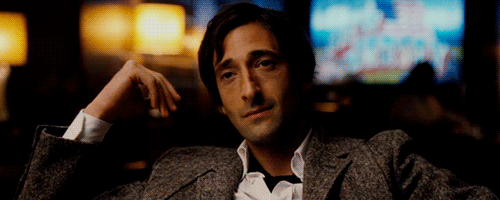
3K notes
·
View notes